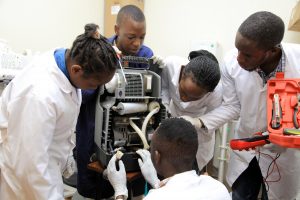Bachelor of Biomedical Engineering
 Biomedical engineering provides advances in medical technology to improve human health with its unique mix of engineering, medicine and science which emerged alongside biophysics and medical physics. Biomedical engineering has diverse work whose applications range from early devices, such as crutches, platform shoes, wooden teeth, and the ever-changing cache of instruments in a doctor’s black bag, to more modern marvels, including pacemakers, the heart-lung machine, dialysis machines, diagnostic equipment, imaging technologies of every kind, and artificial organs, implants and advanced prosthetics. Biomedical engineers are proficient scientists who use the principles of engineering and life sciences and conduct research on the biological aspects of human and animal life. They may be called upon in a wide range of capacities to design instruments, devices and software, to bring together knowledge from many technical sources to develop new procedures, or to conduct research needed to solve clinical problems. Specialists in this field are concerned with developing imaging systems such as magnetic resonance, ultrasound and x-ray machines, techniques and devices to automate or control body functions.
Biomedical engineering provides advances in medical technology to improve human health with its unique mix of engineering, medicine and science which emerged alongside biophysics and medical physics. Biomedical engineering has diverse work whose applications range from early devices, such as crutches, platform shoes, wooden teeth, and the ever-changing cache of instruments in a doctor’s black bag, to more modern marvels, including pacemakers, the heart-lung machine, dialysis machines, diagnostic equipment, imaging technologies of every kind, and artificial organs, implants and advanced prosthetics. Biomedical engineers are proficient scientists who use the principles of engineering and life sciences and conduct research on the biological aspects of human and animal life. They may be called upon in a wide range of capacities to design instruments, devices and software, to bring together knowledge from many technical sources to develop new procedures, or to conduct research needed to solve clinical problems. Specialists in this field are concerned with developing imaging systems such as magnetic resonance, ultrasound and x-ray machines, techniques and devices to automate or control body functions.
Mbarara University Department of Biomedical Sciences and Engineering will include individuals with engineering, physics, mathematics, biostatistics, life science, medical, and clinical specialties. A bachelor’s degree in Biomedical Engineering from Mbarara University of Science and Technology will equip students with advanced knowledge needed for graduate research or for a future career in highly specialized fields. The strength of Biomedical Engineering lies in the ability to strategically grasp knowledge from several areas of engineering and apply it to particular problems in medicine, biology and neuroscience.
